


If you've tried everything else to build a brand that is visible online and make more money but nothing's worked for you... then this is for you. Now you too can accelerate your financial freedom by achieving the same breakthrough money results other men and women are enjoying.

BraveBrand has partnered with multi-millionaire money mentor Paul Counsel to deliver an essential solution that will help you develop your BraveBrain opening your future to new financial possibilities.
This will support your journey to freedom through residual, leveraged income.
Paul Counsel's work has been described as the best money psychology and personal development information on the Internet.
It gets you on the right track straight away and saves you years of learning and thousands of dollars on expensive courses.
It gives you the freedom to feel inspired and refreshed everyday.
Here is how some of Paul's students describe him:

"I would describe him as a man with an abundance of knowledge about money and what it means to be financially wealthy. He provides you with straight forward advice and guides you to your own truth through content"
Teagan
"I can now say I am super excited for my future, with no limits of money blocks and I now have a clear actionable process to change my behaviours around now investing in myself and creating a richer life for myself and being able to provide for my partner!"
Ben Annett
"He is someone who can collapse timelines and save you years of your life simply by listening, asking questions and implementing the behaviours and skills he teaches"
Mel Rance
Before I share with you how BraveBrains works, I want to give you some context as to why this solution is essential if you are serious about making a million dollars.
A few months ago I asked Paul a question, in the hopes it would help me better understand the brain's role in building wealth.
I had been struggling to understand why, when we are given all of the information and steps needed to take action towards our dreams...we tend to fall at the first hurdle.
With information now being completely democratised and freely available online, why aren't more people wealthy and achieving financial freedom?
I knew it wasn't a lack of information, and it had something to do with our psychology. and processes in the brain that I couldn't quite understand.
So I turned to my mentor, Paul Counsel.
Paul has dedicated the last 35 years to understanding the brain and how for most people, it limits their potential. Not due to a lack of brain power but rather due to the chains imposed on our potential at an early age.
Below, is his answer taken from an audio transcription during one of our 1:1 coaching calls.
If you are serious about becoming the person who can make one million dollars, taking 20 minutes to read this passage of text could change your life.
At the end of the text, there will be a button that leads to the details on how you can implement the lessons from the text and start moving towards your first million dollars.
Warning
If you can't commit to 20 minutes reading this, then this path is not for you.
If you can, I hope this message impacts you in the same way it did for me.
Read time: 2o mins
Luke asked:
"Paul, I wanted to ask you, is there an evolutionary design element in the way that human brains evolved that stops most people from making their first million dollars?"
Paul responded:
"What a great question.
It’s a huge question and there's lots of ways to answer it.
I'd be happy to do a one-day workshop on it so that's how in-depth the answer could be.
But let’s start by saying that what prevents most people from making their first million dollars is partially a function of the way the brain developed over time and partially a function of social conditioning.
When you compare making a million dollars to all the complex things we do as human beings, making a million dollars is actually not that difficult.
Now I know that probably sounds absurd but in fact I don’t mean it to be.
Most people only think it’s hard because they don’t know how to go about making a million dollars; but it’s not that difficult to learn how to do it.
It’s just like any other complex thing we learn to do like driving cars, reading music or flying planes for instance.
At this point, you might be tempted to think, okay, if it’s not that difficult, why don’t most people do it?
That's the better question.
Let’s begin by exploring a few ideas around learning, especially skills-based learning.
Think in terms of 100 years ago, 200 years ago, or 300 years ago. We could go anywhere in the developing world. We could go to Europe, to Britain, or to America and look at how skills-based learning was achieved.
We could go back further in time a thousand years, two thousand years, or four thousand years to the Egyptians.
How did anybody become proficient at anything during those times? What was the teaching learning process that enabled the development of creative skills, job skills or mind skills?
Let’s say somebody wanted to be a blacksmith or a carpenter.
We could go back even further to somebody wanting to paint or sculpt like Michelangelo, or draw and invent like da Vinci.
While Michelangelo never took on apprentices, he did take on and work with assistants.
Leonardo da Vinci did an apprenticeship with Andrea del Verrocchio and developed skills in technical training and liberal arts.
Apprenticeships were a common practice during Leonardo’s time, where young people work with an expert for about 13 years to learn a trade.
What if you wanted to become a pyramid builder, you couldn't just go and read a book, or attend a weekend workshop and then say, yeah, I'm a pyramid builder now.
Basically, you had to work with a person who was a well-known pyramid builder because that’s their skill. To be successful, you had to learn skills in mathematics, astronomy, logistics, and advanced engineering.
You might have had to do an apprenticeship with them for years before you gained the necessary building and design skills.
If you wanted to make samurai swords, for example, which is an age-old Japanese tradition, then you’d have to apprentice to the master Japanese sword maker for many years.
Historically, whether you wanted to be a blacksmith or an artist, you had to gain your skills under a master/apprenticeship model of learning. And during that time, you were provided with three important conditions.
The first is that you got time with the master.
The second was knowledge from the master and the third was guidance and feedback under the tutelage of the master.
In any field of endeavour, if you have those conditions working for you, you are going to become skilled in that endeavour.
When it comes to education, it’s as old as history itself. It extends as far back as the first written records recovered from ancient civilizations. It’s based on a one-to-many model.
Today, it’s big business. Teachers are qualified, then placed in oversized classrooms. Over time, we witness them becoming increasingly stressed and frustrated by the number of students they must work with.
Profits first, quality and other considerations after that.
At universities, one lecturer in a lecture theatre can speak to two or three hundred students.
Lots of content can be conveyed during class times but skills development misses out in favour of information remembering and recall testing.
Although the master/apprentice model exists for some trade skills, mainstream teaching and learning offers years of content learning in numerous subjects.
If you pass your tests, you’re considered to be successful.
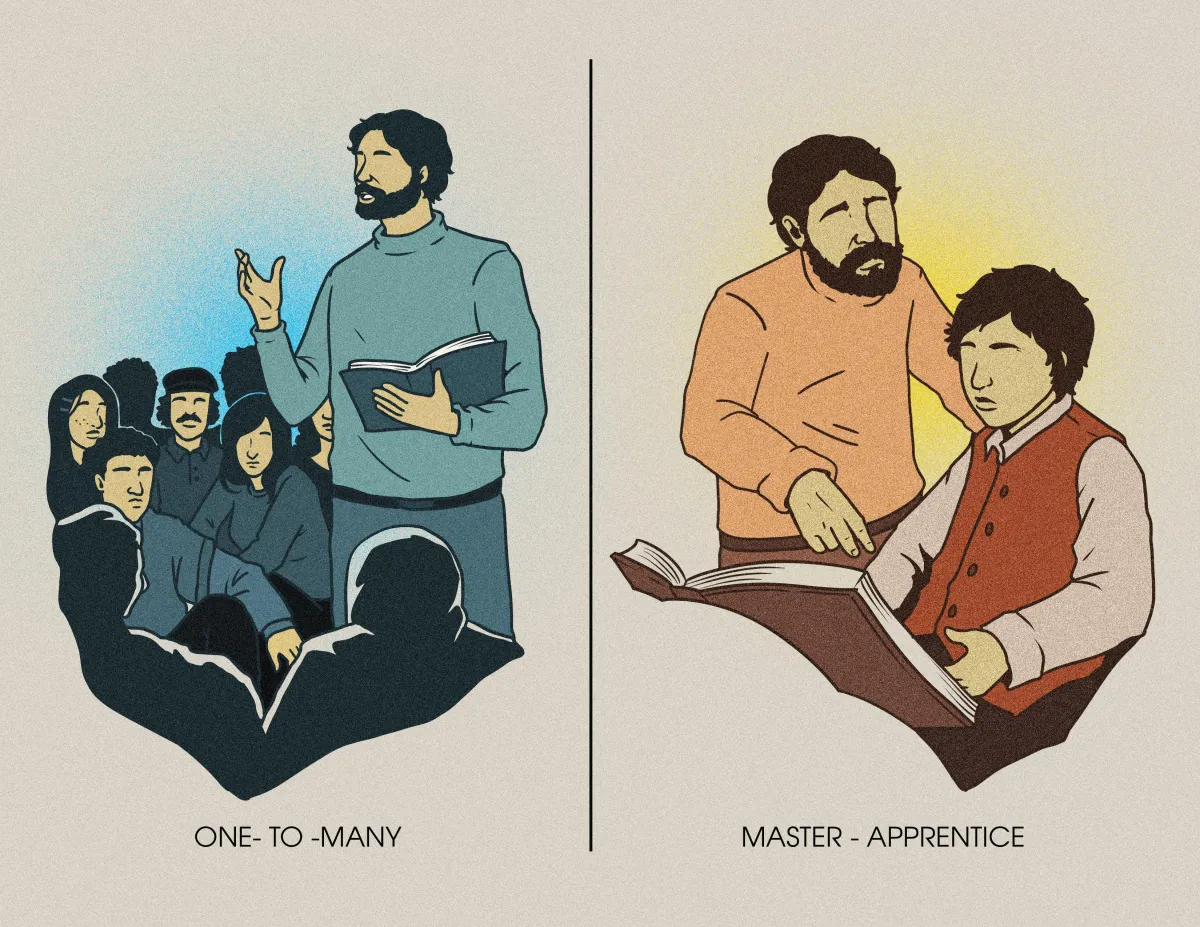
But skills development in wealth making, entrepreneurialism, business, marketing, sales, inventiveness and hands on learning is rarely available.
Education became a massification process of learning.
It replaced the idea where you could work with somebody, a rich person for example, and have them pass on their skills… to you.
It installed the idea that you can learn to become wealthy by reading books or attending “one to many” seminars, workshops, webinars and lecturers.
But those teaching learning environments are missing two of the three critical conditions for real skills-based learning.
You don’t get enough time with the “teacher”, and you don’t get ongoing guidance and feedback during an extended learning process.
Within the one-to-many model, you can get many different degrees and qualifications that allow you to call yourself whatever you want.
But do any of them teach you how to make your first million dollars?
If not, why not?
Perhaps you need something more than content delivery and memory testing.
As soon as you fall into the trap of the one-to-many teaching/learning process, you never get the set of experiences you need to develop the skills you must develop.
You get lots of content, but it’s difficult to get the necessary context for that content unless you’re talking to somebody who can show you how to convert content and context into skilled behaviours.
To get the skills necessary to make content and context work for you, takes time. It also requires constant support and feedback which is generally not available in the one-to-many model.
And without that consistent, supportive feedback, your behaviours don’t change especially when it comes to the use of money or the multiplication of it.
So that’s one side of the answer to the initial question, the social conditioning side.
The other side of the answer has to do with the way the brain developed.
Literally, I could do a multi-day workshop on this topic, but I’ll shorten it for the sake of offering an answer here.
Basically, the brain developed around several high priority functions and its these functions that take precedence over anything else the brain is capable of.
The first critical function is directed towards safety and survival. Is this something that can help me with my safety and survival? If yes, it pays attention to it, if no, it doesn’t.
The second critical function is the avoidance of fear, confusion, frustration, pain and urgent irritation.
Stress related feelings signal the brain to pay attention to whatever the stress conditions are.
If, over an extended period, the brain can’t resolve its stress conditions, stress hormones can become toxic and lead to several chronic health issues.
Toxic stress has damaging effects on learning, behaviour, and health across one’s lifespan. Brains don’t function all that well when stressed especially when it comes to setting clear goals and creating new money related skills.
The third critical function is energy conservation.
The brain is the most expensive metabolic organ in the body.
cAnd because it must exert more energy dealing with something its consciously drawn to attend to, its generally reluctant to do so unless that something has to do with safety and survival.
In other words, if you want the brain to process something that’s new and complex, it will generally resist you because it wants to conserve energy and won’t naturally process anything it doesn’t have to process… it won’t think for you if it doesn’t have to.
Things that are hardwired into the brain are things to do with survival.
Survival offers the possibility of passing on your genes and if you’re not safe then you can’t survive and you can’t pass on your genes.
One of its primary signals for safety is the feeling of comfort or discomfort.
Whenever you’re out of your comfort zone, the feeling you experience is discomfort. Depending on the perception of the stressor, discomfort can be processed as fear or agony.
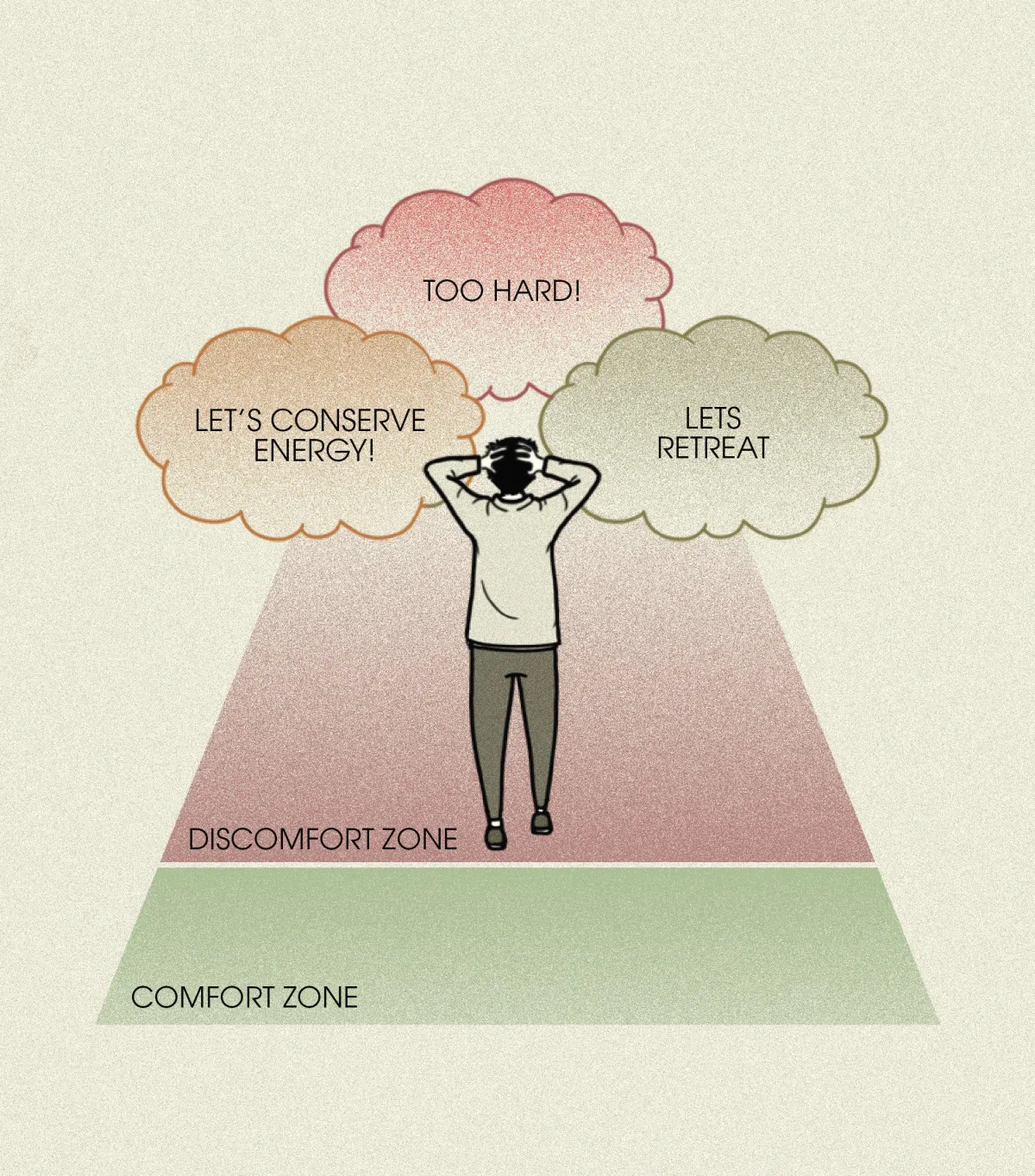
If the brain’s number one priority is survival and safety, the feeling of discomfort tells the brain that something is not right because if it was right, it wouldn’t feel uncomfortable.
If it was right, it would feel right. It would be calming or more enjoyable.
Every time you take your brain to where it’s not familiar, your brain is going to send you a prediction error.
And that prediction error says, if you don’t get back to where you feel safe, secure and comfortable, something dangerous is about to happen because something is not right. And that something might be going to eat you or put you at risk.
Over time, you learn that when you move into discomfort, your brain is telling you it’s not safe, something’s wrong.
As a result, most people retreat from discomfort and never give themselves the opportunity to learn what it feels like to be on the right path to becoming a millionaire.
Remember that the brain’s third priority is energy conservation. So, it’s not going to do the determined thinking for you. Instead, all its prior learnings and expectations are going to take you back to where it feels comfortable for you.
Most people have a fear of the unknown and a deep sense of loss aversion.
And even though they say they’d like to achieve different outcomes or have money freeing lifestyles; their preference is the known rather than the unknown.
Some people can push themselves past their fears and learn high achievement skills because they understand the feelings outside their comfort zones.
Learning, expansion and development take place outside the experiences of your familiars… outside your comfort zone and in your discomfort zone.
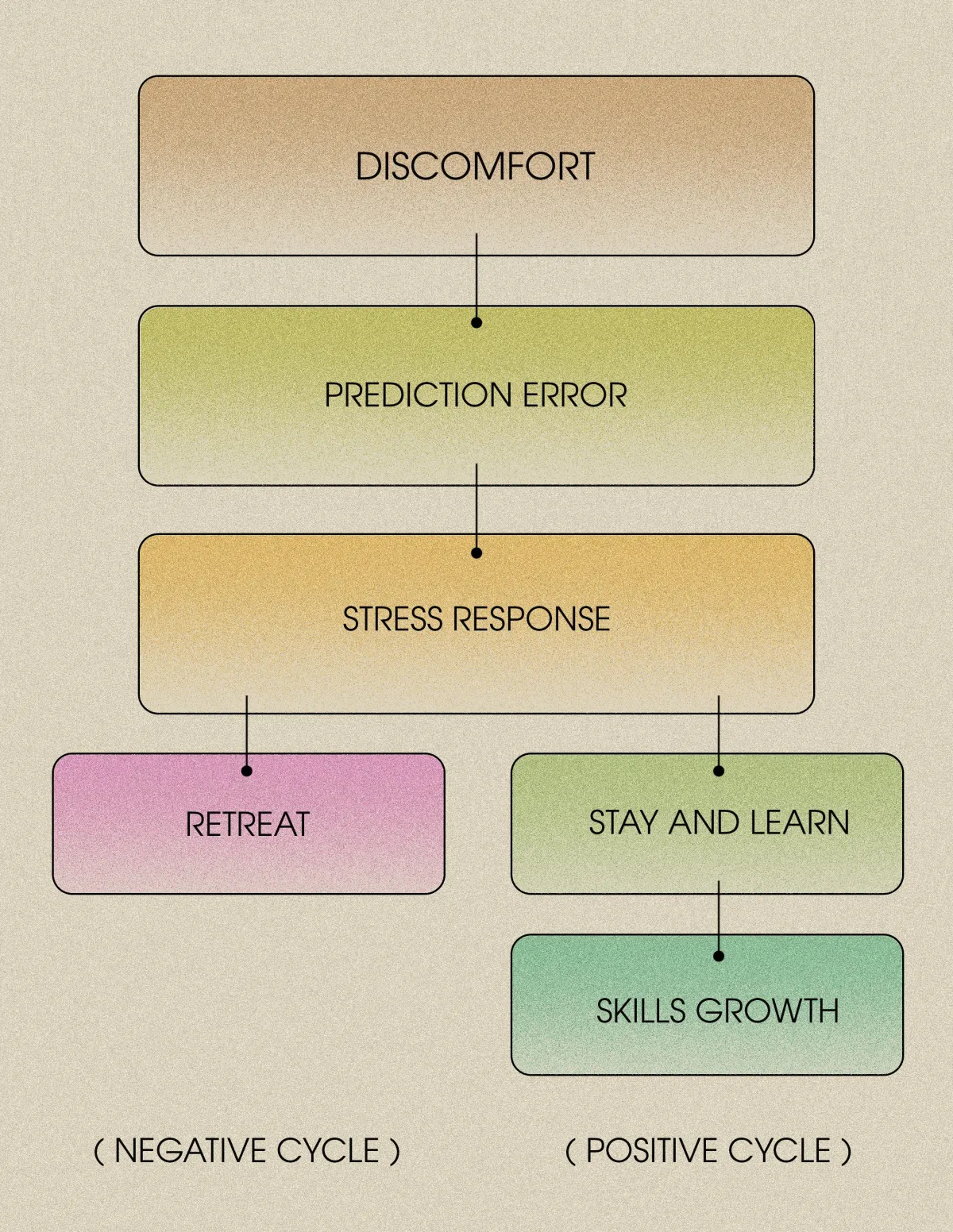
But the feeling of discomfort can be overwhelming for people because the brain is saying something’s not right.
The error message develops because you’re outside your familiar zone, not necessarily because you’re doing something wrong.
If you fail to recognise the positive value of a particular prediction error you’re going to back off.
If you want growth towards making your first million dollars, you must give the feeling of discomfort new meaning.
Whenever you’re learning something that’s new or complex, you’re being stretched, and your brain is going to give you a prediction error signal.
And that prediction error signal is going to cause stress hormones to activate in your body. And if you obey that prediction error signal, you are never going to learn the experiences you need to learn to develop skills in what you want… making your first million dollars for example.
Instead, you retreat into your comfort zone because most people can’t give the feeling of discomfort a new meaning. If you trust the person you’re learning from, the new meaning for that feeling is that you’re on the right pathway.
Even though your brain is offering you a prediction error, if you want to make your first million dollars, you must override the prediction error and say that discomfort is the right feeling to have to continue my growth.
On your pathway towards making your first million dollars, discomfort is the correct feeling because you’ve never made a million dollars before. And because you’ve never made one before, your brain can’t recognise the right pathway, so it gives you a prediction error.
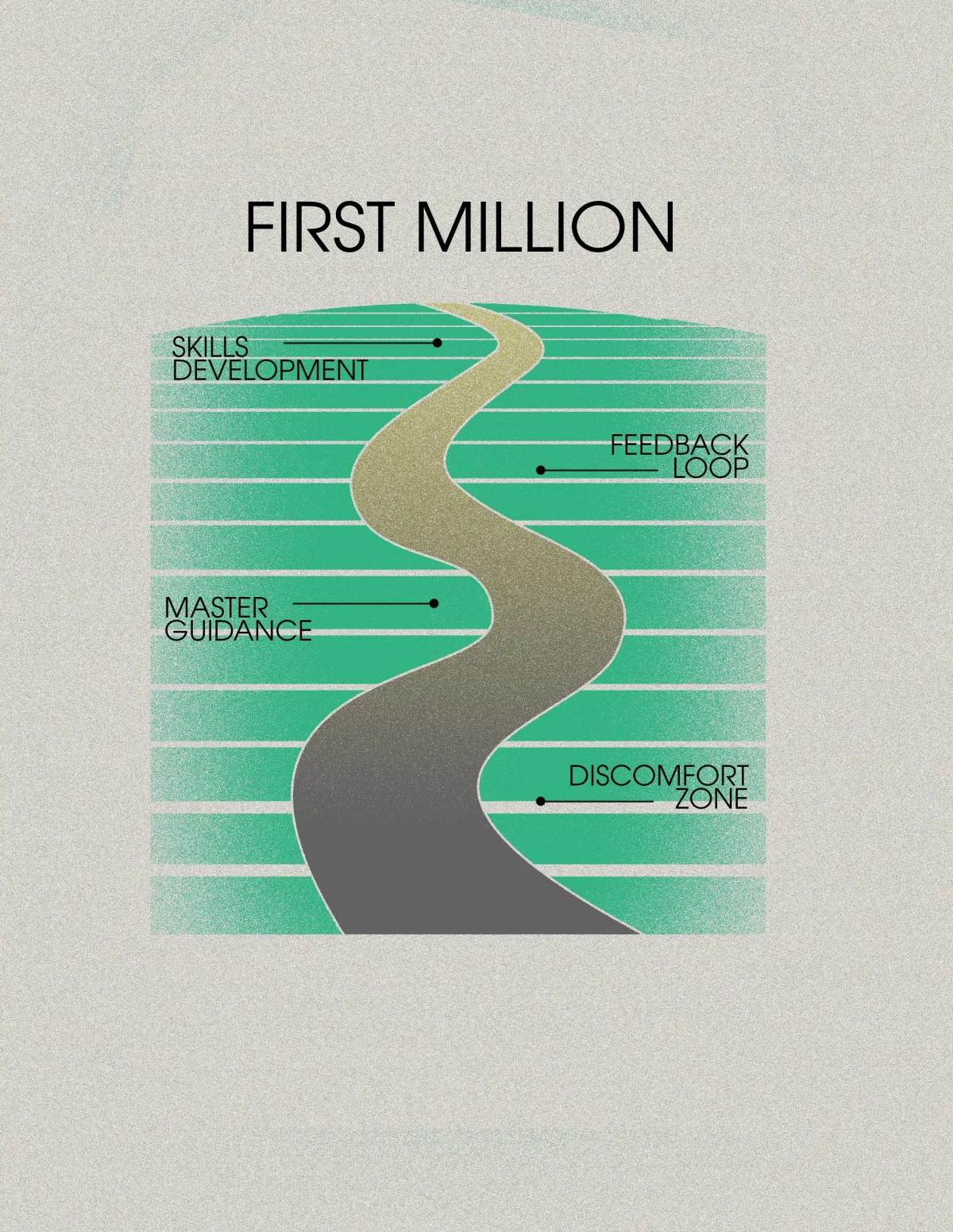
If you want to learn, you must stay in that discomfort and get the feedback from somebody who understands what’s going on.
Over time your brain expands its experiences in the context of making more money.
The second million is easier than the first because it’s now a recognisable pathway.
Once you’ve expanded your experiences, what was once discomfort becomes comfort. And now your brain knows that you’re learning to become skilled in whatever this new thing is.
And this is exactly what the master/apprentice model of learning enabled you to do. It gives you content, it gives you time with the master, and it gives you support and feedback until your new skills were sufficiently developed.
The reason most people never become wealthy is because they never stay long enough in the master/apprentice relationship, or they never take on the master/apprentice relationship to begin with.
Instead, they’ve been fooled by the idea that you can go to university or read books or attend seminars and learn to become wealthy.
But you can’t because there’s no behavioural process that you’re being skilled at and there’s no behavioural feedback or support letting you know whether you’re doing something in the most effective way.
If you want real progress, you need constant feedback just like if you were learning carpentry, or bricklaying or plumbing or blacksmithing.
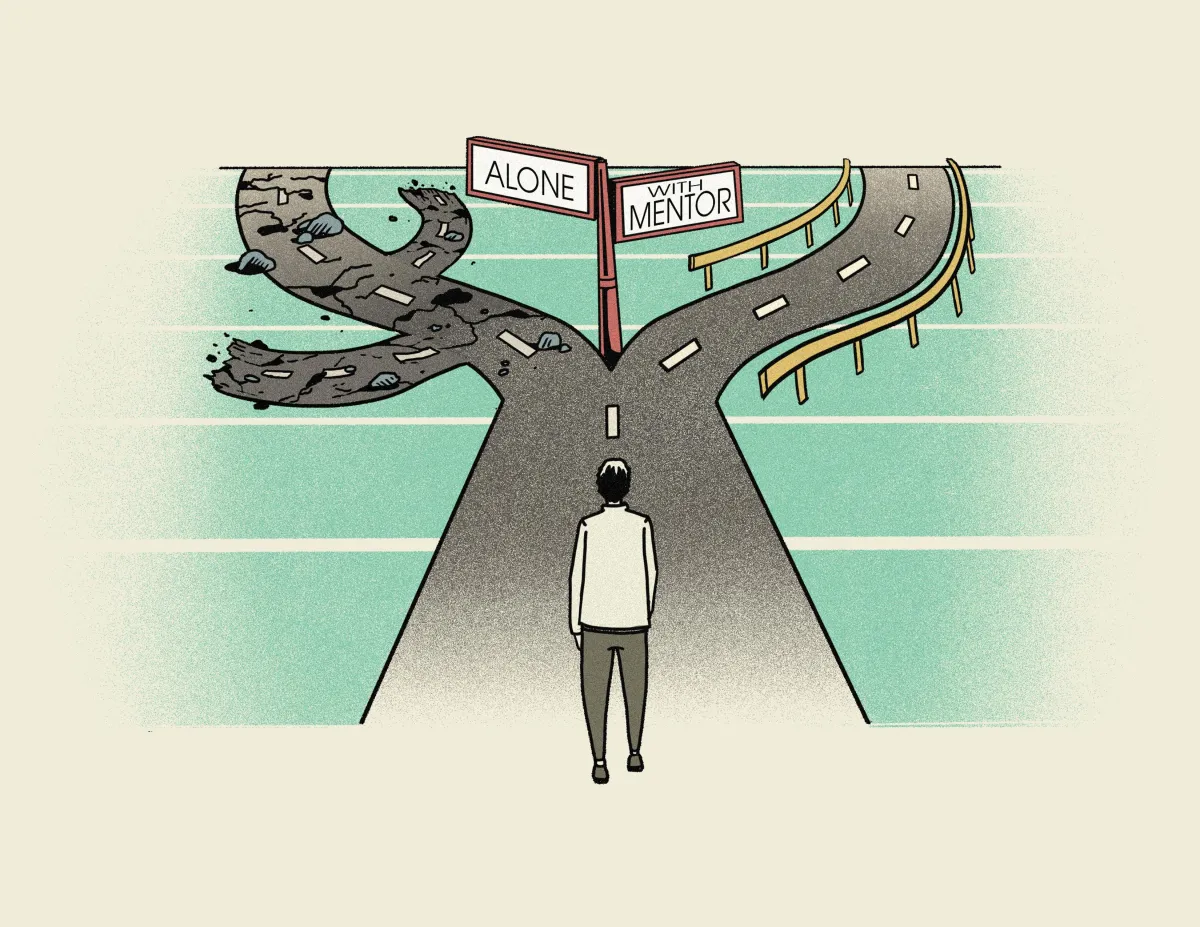
In summary, there’s a combination of things that prevent most people from making their first million dollars and becoming wealthy.
One of them is the way that education has fooled people into thinking they can go to a class and learn it.
In addition, you’ve been socially conditioned to earn and spend money, not earn and multiply it.
Rather than spend time investing in yourself, in your growth, you spend time seeking rewards through spending on things that can never contribute to your wealth.
Instead of wealth learning, you learn to spend in ways that contribute to lifetime stress, worry, concerns and becoming stuck.
Another part of the answer to, “is there an evolutionary design element in the way that human brains evolved that stops most people from making their first million dollars” is the evolutionary design pathway of the brain itself that creates prediction errors whenever you’re outside your zone of familiars.
So, part of the learning that blocks you from wealth is social conditioning and social adoption.
And the other part is the brain’s evolutionary design process. Both of which you need to develop workarounds to overcome.
You can read just about any book on highly successful people, and they’ll all suggest the same thing.
It doesn’t matter whether they’re athletes, or businesspeople or wealthy people.
They all say they had an excellent coach, or an excellent mentor.
Think about Robert Kiyosaki and what he learned from his Rich Dad verses what he learned from his Poor Dad.
Think about Tony Robbins and what he learned from Jim Rohn.
If you type, ‘what is the value of a good mentor’ into ChatGPT, you’re likely to get an answer along these lines.
A good mentor can provide a mentee with many benefits, including:
Guidance: Mentors can help mentees navigate their careers by sharing their knowledge, skills, and experience.
This can help mentees avoid mistakes and identify areas for improvement.
Perspective: Mentors can offer a different perspective on a situation, which can help mentees accelerate their learning and development.
Feedback: Mentors can provide constructive feedback on work and help mentees identify areas for improvement.
Networking: Mentors can help mentees find resources and networks.
Support: Mentors can be a resource and source of support for mentees.
There are no shortcuts to your first million.
If you’ve never done it before, there is no “faster way to do it”!
Your first million will take as long as it takes… you can do your second one faster because of the learning you gain through your first million.
If you have the drive and ambition to create your first million, don’t try to do it by yourself.
Work with someone, anyone, who has previously made millions for themselves.
Let them guide you, teach you, support you and offer constant feedback so you don’t lose time and traction through mistake making.
Sadly, most people absorb learning they’re not even conscious of.
Through social copying and adaptation, they take on learning from people who are not wealthy.
If the people around you are just like you, that’s the content and skills you’re developing.
If you want to be a highly successful athlete, you must get around athletes that are more skilled than you.
If you want to be a great musician, you’ve got to get around great musicians.
If you want to be rich, then work with rich people.
The longer you do, the more skills you develop and the more successful you become.
So, that’s the short answer in place of a more detailed answer to…
“is there an evolutionary design element in the way that human brains evolved that stops most people from making their first million dollars”?
INTRODUCING
BraveBrains Mastermind
Now you too can Leverage 30+ years of proven strategies to amplify your brand’s influence, multiply your revenues, and reach consistent $30k months and beyond alongside someone who has built four multimillion-dollar brands from the ground up.
Watch The Video

100% risk free - 30 day money back guarantee
Join in 3 Easy Steps
Fill out the form on this page and complete the checkout.
After payment, our team will send you a unique code to join our Mastermind Telegram Channel and Education Group.
If you need help, you can reach Luke via Telegram chat: https://t.me/lukesbrave
When you join BraveBrains, you get exclusive access to:
LIVE Monthly Mastermind Calls with Paul Counsel (Priceless)
Tap into the mind of a self-made multimillionaire with over 30 years of financial freedom.
BraveBrains Monthly Implementation Challenges (Value: $297)
Knowledge without action is useless—that’s why each month, we give you a clear, actionable challenge based on Paul Counsel’s teachings.
100+ Proven Viral Video Hooks & Templates (Value: $497)
Swipe the exact high-converting, viral content structures used by top influencers.
Overcoming Fear & Imposter Syndrome Training (Value: $997)
Break free from the mental barriers keeping you stuck in obscurity.
Direct Support from Luke & The BraveBrains Team (Value: $299)
No more guessing—get expert guidance so you never feel lost again.
You'll also get these exclusive bonuses:
3 x Offer Creation Worksheets and templates
Enterprise and Achievement Manifesto
Designing Lucrative Business Proposals
Designing Your $25K Offers
Total value: Well Over $4,590
Today Just $40
Here's How Results Changed For Luke, founder of BraveBrand
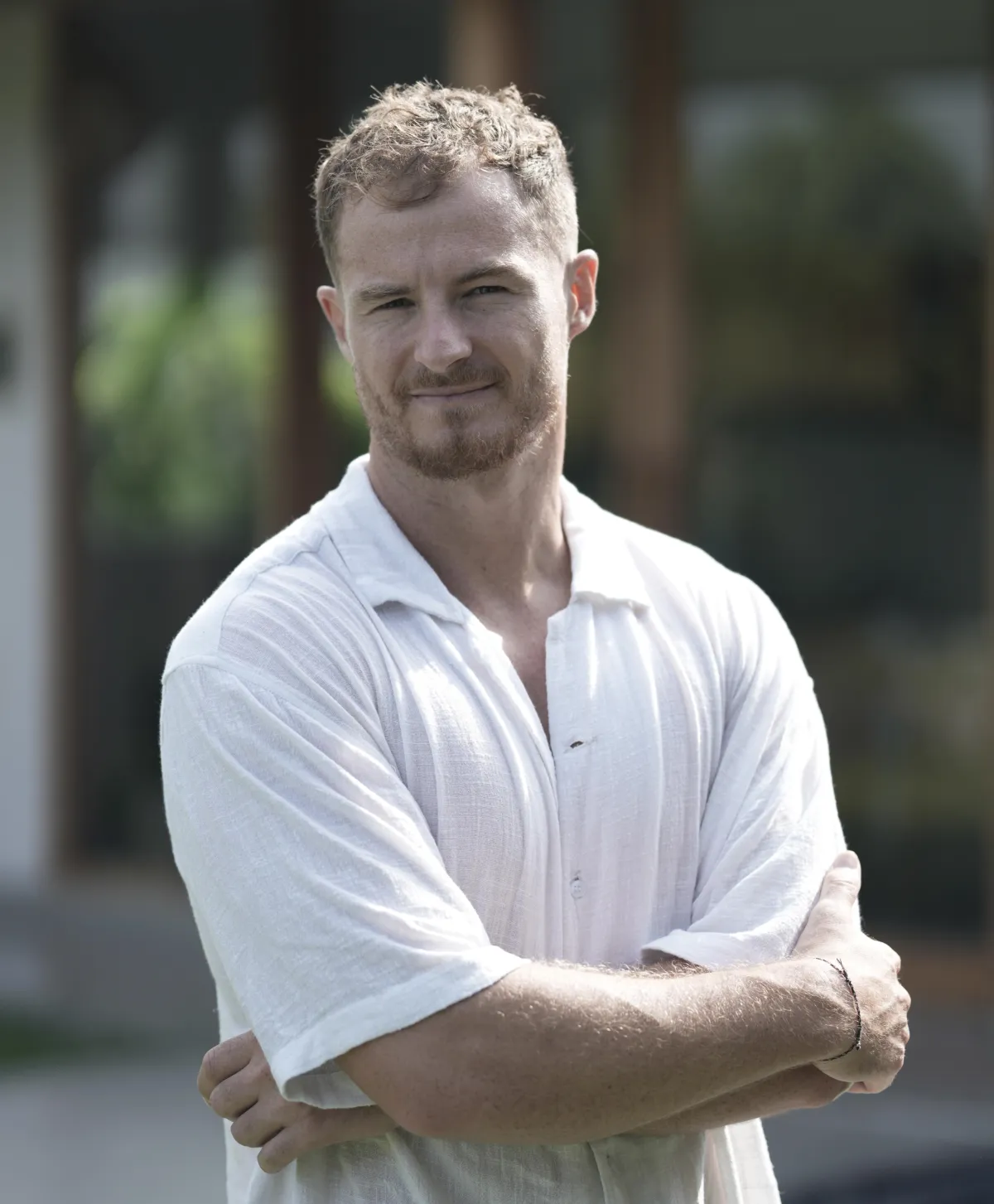
"Working with Paul has been one of the most eye-opening experiences of my life. I’ve always been deeply interested in this subject, yet every book I read or piece of information I came across felt like it was written in some kind of secret code—until now.
The way you break down these concepts is crystal clear, completely actionable, and leaves zero room for ambiguity. Since working with Paul directly, I’ve gained an entirely new level of awareness about my own behaviors around money. More importantly, I’ve been able to modify them in real-time to accelerate the success of my business.
Understanding how I was conditioned—just like everyone else—to spend mindlessly, either to fuel the economy or to keep up with societal expectations, has given me a new and much-needed sense of calm when it comes to money. I’m still learning every day, but my path is clear. And because the information you provide is what I consider “Fully Integrated Honesty”, my confidence in both the process and where it will take me has skyrocketed."
Founder of BraveBrand
BraveBrains is part of BraveBrand™ | Terms & Conditions